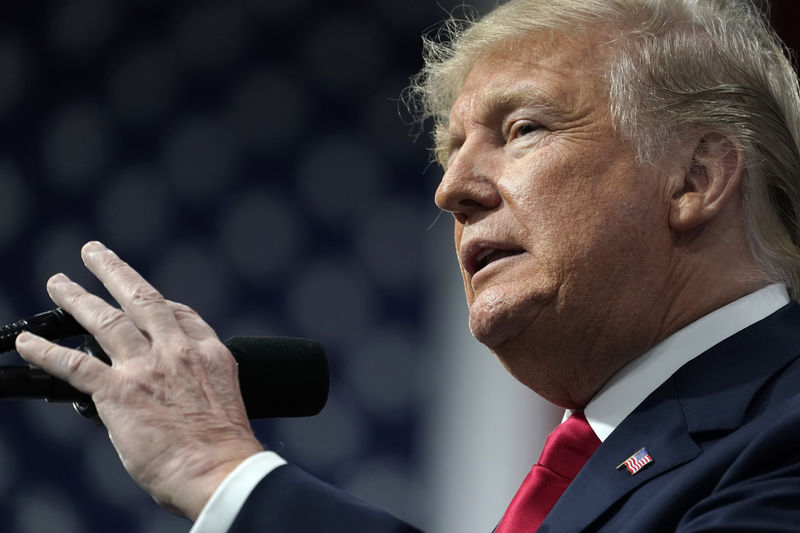 © Reuters. Trump Wants Allies to Pay for Protection
© Reuters. Trump Wants Allies to Pay for Protection(Bloomberg Opinion) — It’s increasingly clear that U.S. President Donald Trump isn’t really confused about how the North Atlantic Treaty Organization’s funding really works. Rather, he doesn’t care, because he wants a different global security system from the current one. In Trump’s vision, the U.S. is a global enforcer who will only protect those who pay for it.
Trump’s July 4 tweet demanding that the Organization of Petroleum-Exporting Countries lower the oil price because “the United States defends many of their members for very little $’s” shows that this isn’t just about NATO. Trump’s U.S. doesn’t have allies or even vassals. It has paying customers for its security business, the way the principality of Hesse did in the 18th century, when it rented out its oversized professional army to Sweden, Britain, Bavaria and pretty much anyone who could pay for it.
Many U.S. liberals and conservative isolationists have long been uncomfortable with the country’s role as a global cop, the enforcer of a certain system of rules no matter what the cost. They’d rather farm out regional security to regional organizations or revert to the old system of spheres of influence. Trump, however, isn’t pushing any of those versions of isolationism.
“You do not need today’s defense budget to defend the United States,” Newt Gingrich has argued. “You need today’s defense budget to lead the world. If you are prepared to give up leading the world, you can have a much smaller defense budget.” Trump has moved to increase U.S. military spending, not to reduce it. He just wants other countries to pay the U.S. back for the service it supposedly provides.
This isn’t really about forcing NATO members to spend 2 percent of their economic output on defense, though the Trump administration has sent them strongly-worded letters to that effect ahead of next week’s summit of the organization. Trump understands the U.S. won’t get much out of that increased spending except perhaps some contracts to provide equipment. Even a major arms deal like the one with OPEC leader Saudi Arabia that Trump announced last year doesn’t cut it as payment for U.S. protection.
What Trump wants in exchange for renting out the U.S. might is trade preferences and other U.S.-friendly economic outcomes on a major scale. The linkage is obvious in his mind.
“We have a MASSIVE trade deficit with Germany, plus they pay FAR LESS than they should on NATO & military,” he tweeted last year. “Very bad for U.S. This will change.” Germany, in other words, should pay for U.S. protection by reducing its trade surplus. The OPEC tweet sets up a similar relationship between security and an economic outcome that Trump thinks would benefit the U.S. – a reduction in oil prices.
The question, as in any such transactional relationship, is whether what Trump is selling on behalf of the U.S. is worth the price he wants.
According to the International Monetary Fund, Saudi Arabia needs oil at $85 to $87 a barrel to balance its budget. crude is at about $77 now. Crown Prince Mohammed bin Salman has an ambitious, costly modernization plan that would be chronically underfunded if oil prices fell. And, as the world’s third biggest defense spender last year, after U.S. and China, Saudi Arabia doesn’t need much in terms of external protection.
In Germany, too, the interests of exporters are far more important than any concerns about an external military threat. Germans consider terrorism their biggest security problem, but fighting it is seen as a job for the German government. A sizable minority in Germany’s western states and a majority in the eastern ones regard the U.S. as a threat to world peace. Given such public opinion trends, Germany’s not likely to pay Trump the way he wants to be paid.
If Trump’s transactional approach shapes U.S. policy for any length of time, competitive offerings will be legitimized. Russian President Vladimir Putin was only half-joking when he offered French President Emmanuel Macron alternative protection earlier this year. China is in a position to become a security provider for smaller Asian and African states. Why not offer these services more or less openly if that’s what the U.S. is doing? And why not charge significantly less than the U.S., given that, with much leaner defense spending, the Russian and Chinese militaries are quite capable of meeting most regional challenges?
Even if Trump doesn’t understand it yet, the U.S. won’t necessarily be competitive for long if global security turns into a marketplace. But then, perhaps he doesn’t care: After all, there will always be isolationist arguments on which to fall back. It’s up to the rest of the world to start planning for a global security system in which the U.S. will only provide guarantees at a high price and one that can change according to a president’s whims. It’s not necessarily what the future holds, but it appears to be Trump’s preferred scenario.
Source: Investing.com




























